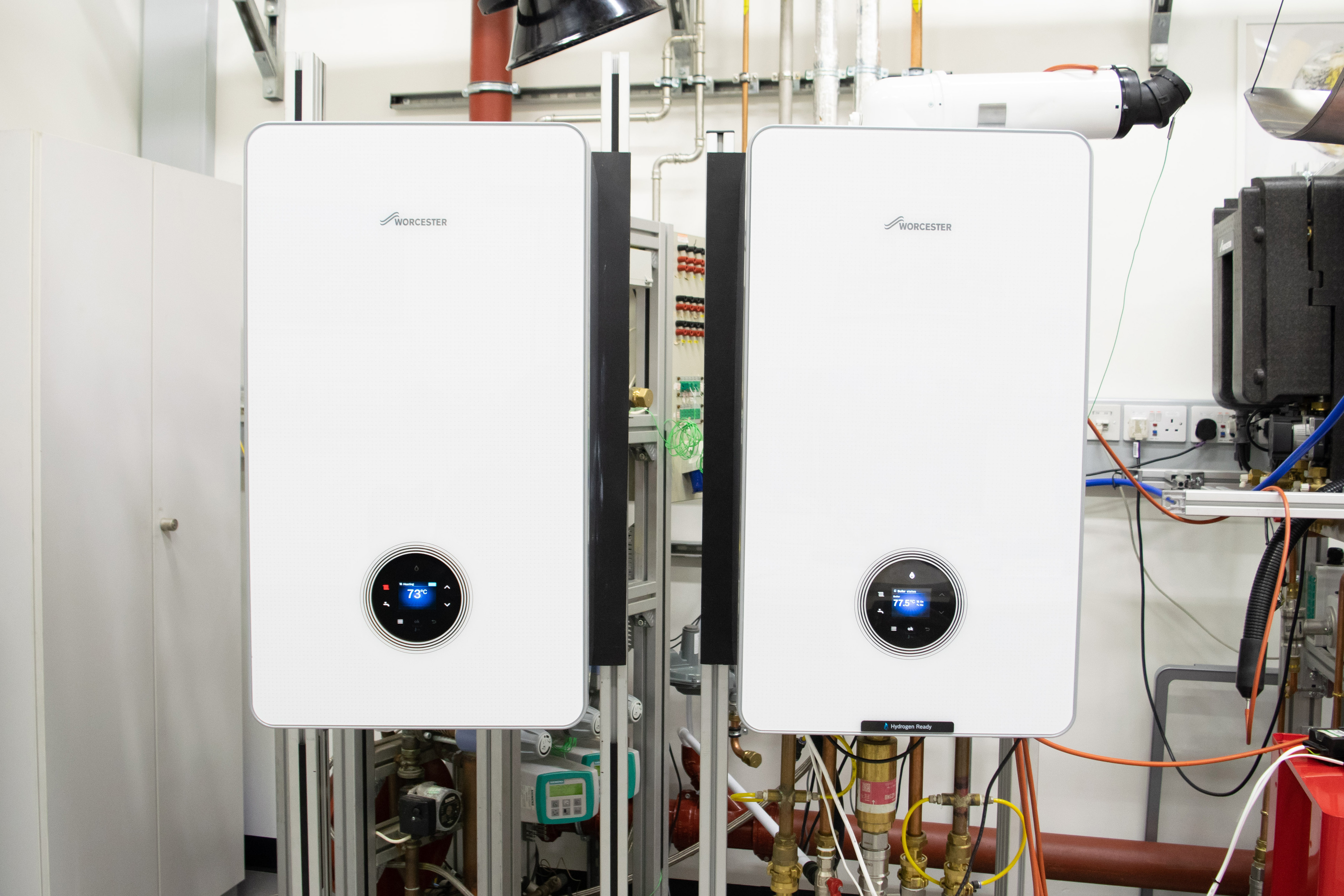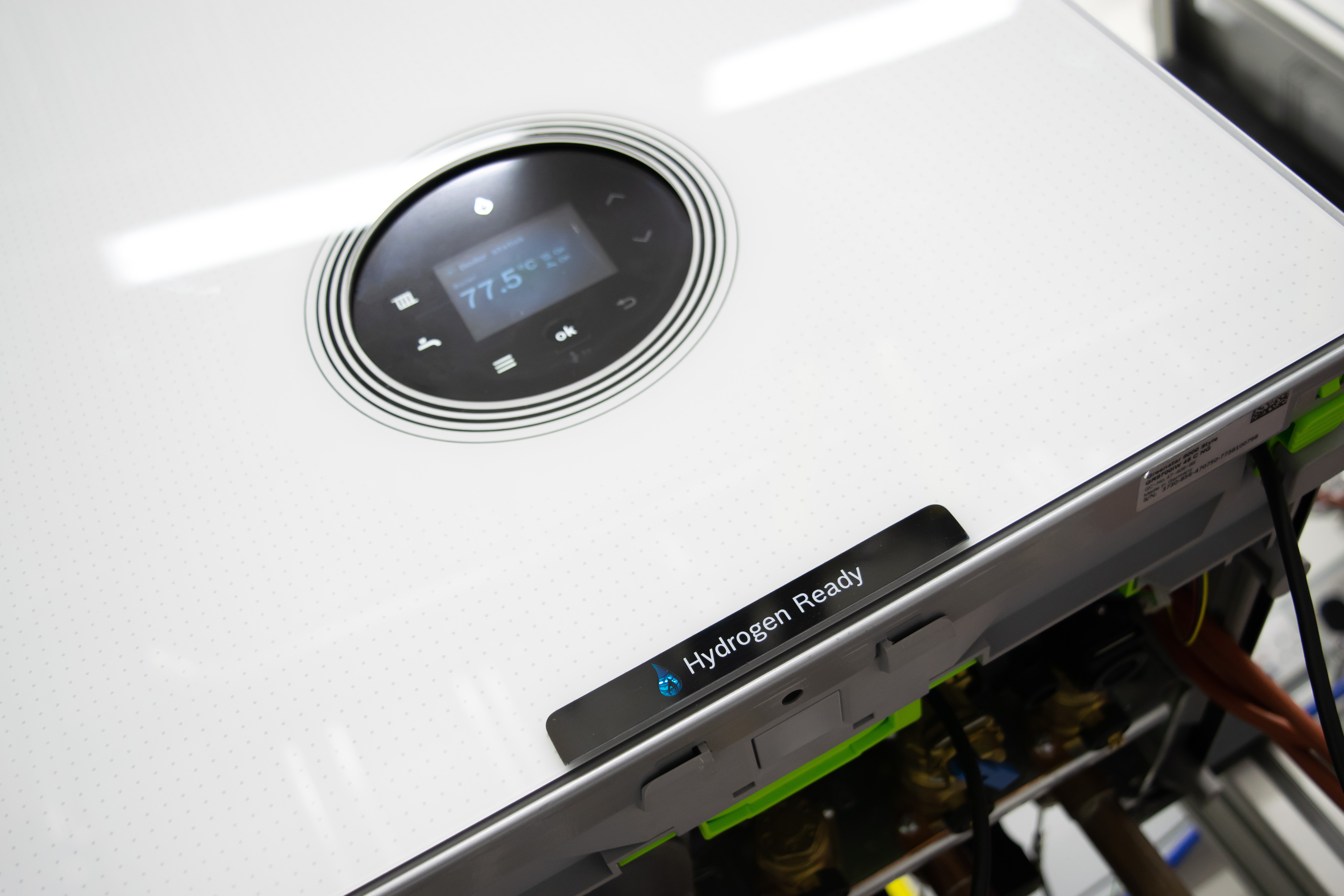You are here: Hydrogen boilers from 2025?
UK households could have their homes and hot water heated with ‘green’ hydrogen gas as natural gas boilers are phased out within the next decade. The entire gas network could be converted to supply clean-burning hydrogen under radical plans to tackle climate change. But not everyone is convinced. Environmental campaigners say replacing gas boilers with electric heat pumps is a greener solution.
Why do we need to change?
New sources of heating must be found if Britain is to significantly reduce the country’s carbon footprint and achieve our “net zero” target by 2050. Heating our homes accounts for almost a third of the UK’s total carbon emissions with 85 per cent of UK households being heated with natural gas-powered boilers. We need to change because not only are fossil fuels running out, but the carbon emissions cannot escape the atmosphere, causing temperatures across the globe to rise (the so-called greenhouse effect) and damaging the planet. One solution is to replace natural gas boilers with hydrogen gas.
 Image supplied by Bosch Thermotechnology Ltd
Image supplied by Bosch Thermotechnology Ltd
How would it work?
It would require the conversion of all household gas appliances (boilers, cookers and central heating systems) from natural gas to hydrogen gas. Gas companies say this is feasible and compare it to the nationwide programme to convert boilers and cookers from ‘town gas’ to natural gas in the 1960s and 1970s. For the first 150 years, the UK gas industry distributed locally manufactured town gas (made from coal and then oil) which contained 50 per cent hydrogen with smaller quantities of methane and carbon monoxide. Following the discovery of natural gas (mainly methane) in the North Sea, the industry switched to natural gas.
Is hydrogen greener than natural gas?
Pure hydrogen only produces water and heat when burnt. While natural gas emits the least carbon dioxide per unit of energy of any fossil fuel, it is still more than produced by burning hydrogen which produces no carbon at all.
Hydrogen is not found in a pure state on Earth. It must be made from other substances, either by electrolysis using electricity to split water into oxygen and hydrogen or extracting it from natural gas, a process known as ‘steam methane reformation’ (SMR).
Electrolysis of water doesn’t create carbon dioxide. But to make it totally green the electricity would need to be powered by renewables, such as wind, solar and tidal power. An experimental electrolysis plant opened in Germany last summer to produce green hydrogen on a commercial scale.
Burning hydrogen as a fuel doesn’t produce carbon. Extracting hydrogen from natural gas does, however. The gas industry says it will capture the carbon and store it underground, for example injecting it under the North Sea. Scientists point out it will be important to measure the impact on seawater chemistry before widespread adoption of this solution, to avoid shifting the environmental problem from the atmosphere to the oceans.
What are the advantages of hydrogen?
One key advantage is the hydrogen network could use the same natural gas pipelines. Old metal pipes are already being replaced by plastic ones which are suitable to carry hydrogen. Hydrogen reacts with the iron pipes, causing cracking whereas polyethylene is safe. Analysts say the UK started a programme of hydrogen-proofing its gas network without realising it. About 90% of pipes will have been updated by 2030.
Another advantage is that a hydrogen boiler looks similar to a natural gas boiler and works in much the same way, so could be a like-for-like replacement. The Bosch Group, a leading supplier, says a hydrogen-fuelled boiler offers low-carbon, high-temperature heating without the need for home insulation or heating systems being overhauled.
What about the disadvantages?
Producing hydrogen from natural gas is not carbon free. The UK doesn’t currently have any carbon capture and storage facilities – and it possibly won’t at the scale needed for at least a decade. Plus, SMR is energy hungry, say green campaigners. Producing hydrogen to replace existing levels of natural gas consumption would mean increasing UK imports of natural gas.
Perhaps the biggest drawback is that it would only reduce carbon emissions by a third between now and 2050, according to a report by the National Infrastructure Commission. The UK needs to make much bigger cuts to achieve zero emissions from heating. Friends of the Earth claims the gas industry is desperate to keep the UK hooked on gas.
Will hydrogen boilers be safe?
You don’t have to be an engineer to know that hydrogen is dangerous. When people hear the word ‘hydrogen’ they think of the 1937 Hindenburg air ship disaster, the result of a fire and then hydrogen explosion in New Jersey. Hydrogen is more explosive and more prone to leaking than natural gas. So, the other big problem is safety. What would happen if hydrogen leaked into a home? Measures can be taken to reduce any risk. Every property will need an initial survey to check the adequacy of existing pipework before a hydrogen boiler is installed, for example.
Pilot projects
Northern Gas Networks (NGN), which is responsible for supplying gas across northern England, has made Leeds a pilot “hydrogen city.” The project involves the conversion of natural gas into hydrogen. NGN says the results show that that switching the UK gas network to 100 per cent hydrogen is technically possible and could be delivered at a realistic cost. Phase 2 of the study is looking at safety implications. The earliest practical date for the initial conversion of a UK city is 2025, according to a report on the project.
In Scotland, about 300 homes in Fife will be fitted with free hydrogen boilers and cooking appliances to be used for four years in a test of whether hydrogen gas could work as a low carbon solution. Up to 1,000 homes could be included if the first phase in 2022 is successful.
Can I buy a hydrogen boiler now?
It isn’t yet possible to buy a hydrogen boiler, but some manufacturers are now so sure hydrogen is the future they have begun to develop appliances. In February 2020, Worcester Bosch unveiled the prototype of its first ‘hydrogen-ready’ boiler. Initially it will run on natural gas, and then after a visit from a servicing engineer be ready to run on 100 per cent hydrogen. Other manufacturers, such as Baxi, have also developed hydrogen ready boilers.
Will every home be suitable?
Homes will need to be connected to the gas supply network to receive hydrogen heating. Off-grid properties and new homes which will be built without gas boilers, will need low-carbon alternatives, like heat pumps, which use electricity and draw warmth from the atmosphere.
Clearly low-carbon hydrogen gas has potential for the future. Hydrogen-fuelled boilers can continue using the existing gas network and consumer disruption is low. The downside is in the production phase. Not only is it expensive but producing hydrogen from natural gas isn’t carbon free. The technology will continue to be trialled over the next few years and only time will tell if UK homes will the first in the world to be hydrogen heated.
 Image supplied by Bosch Thermotechnology Ltd
Image supplied by Bosch Thermotechnology Ltd
If you are considering extending or altering your home, you may find some of these services useful:
Architectural Design Services
Find local Architectural Design experts
Find an Interior Designer
Find details of local Interior Designers
Help with Planning Permission
Find Professionals who can help you apply
Builders
Find local help with a building project
Structural Inspections
Find an expert to carry out a structural inspection
Structural Calculations
Find an expert to provide Structural Design Calculations
Building Surveys
I want a local surveyor to do a Building Survey for me